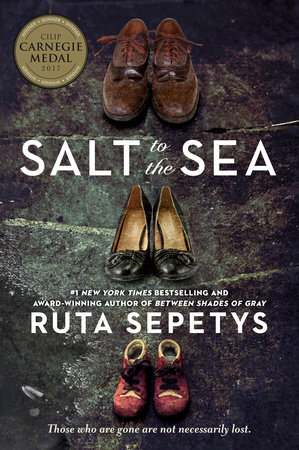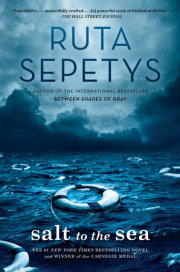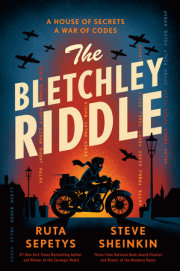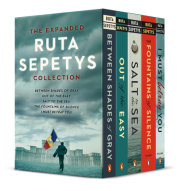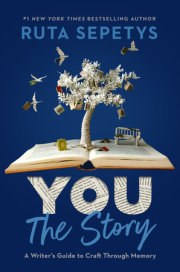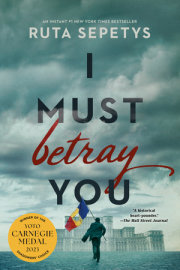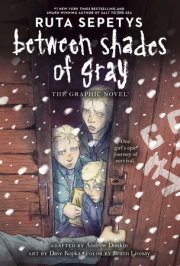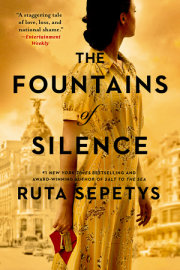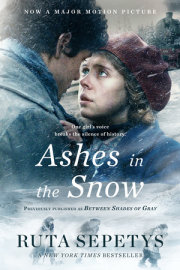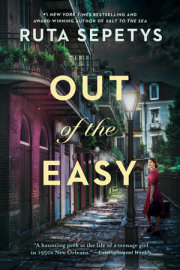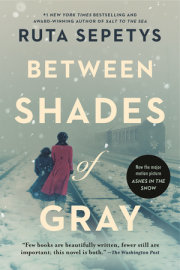joanaGuilt is a hunter.
My conscience mocked me, picking fights like a petulant child.
It’s all your fault, the voice whispered.
I quickened my pace and caught up with our small group. The Germans would march us off the field road if they found us. Roads were reserved for the military. Evacuation orders hadn’t been issued and anyone fleeing East Prussia was branded a deserter. But what did that matter? I became a deserter four years ago, when I fled from Lithuania.
Lithuania.
I had left in 1941. What was happening at home? Were the dreadful things whispered in the streets true?
We approached a mound on the side of the road. The small boy in front of me whimpered and pointed. He had joined us two days prior, just wandered out of the forest alone and quietly began following us.
“Hello, little one. How old are you?” I had asked.
“Six,” he replied.
“Who are you traveling with?”
He paused and dropped his head. “My Omi.”
I turned toward the woods to see if his grandmother had emerged. “Where is your Omi now?” I asked.
The wandering boy looked up at me, his pale eyes wide. “She didn’t wake up.”
So the little boy traveled with us, often drifting just slightly ahead or behind. And now he stood, pointing to a flap of dark wool beneath a meringue of snow.
I waved the group onward and when everyone advanced I ran to the snow-covered heap. The wind lifted a layer of icy flakes revealing the dead blue face of a woman, probably in her twenties. Her mouth and eyes were hinged open, fixed in fear. I dug through her iced pockets, but they had already been picked. In the lining of her jacket I found her identification papers. I stuffed them in my coat to pass on to the Red Cross and dragged her body off the road and into the field. She was dead, frozen solid, but the thought of tanks rolling over her was more than I could bear.
I ran back to the road and our group. The wandering boy stood in the center of the path, snow falling all around him.
“She didn’t wake up either?” he asked quietly.
I shook my head and took his mittened hand in mine.
And then we both heard it in the distance.
Bang. florianFate is a hunter.
Engines buzzed in a swarm above.
Der Schwarze Tod, “the Black Death,” they called them. I hid beneath the trees. The planes weren’t visible, but I felt them. Close. Trapped by darkness both ahead and behind, I weighed my options. An explosion detonated and death crept closer, curling around me in fingers of smoke.
I ran.
My legs churned, sluggish, disconnected from my racing mind. I willed them to move, but my conscience noosed around my ankles and pulled down hard.
“You are a talented young man, Florian.” That’s what Mother had said.
“You are Prussian. Make your own decisions, son,” said my father.
Would he have approved of my decisions, of the secrets I now carried across my back? Amidst this war between Hitler and Stalin, would Mother still consider me talented, or criminal?
The Soviets would kill me. But how would they torture me first? The Nazis would kill me, but only if they uncovered the plan. How long would it remain a secret? The questions propelled me forward, whipping through the cold forest, dodging branches. I clutched my side with one hand, my pistol with the other. The pain surged with each breath and step, releasing warm blood out of the angry wound.
The sound of the engines faded. I had been on the run for days and my mind felt as weak as my legs. The hunter preyed on the fatigued and weary. I had to rest. The pain slowed me to a jog and finally a walk. Through the dense trees in the forest I spied branches hiding an old potato cellar. I jumped in.
Bang. emilia
Shame is a hunter.
I would rest a moment. I had a moment, didn’t I? I slid across the cold, hard earth toward the back of the cave. The ground quivered. Soldiers were close. I had to move but felt so tired. It was a good idea to put branches over the mouth of the forest cellar. Wasn’t it? No one would trek this far off the road. Would they?
I pulled the pink woolen cap down over my ears and tugged my coat closed near my throat. Despite my bundled layers, January’s teeth bit sharp. My fingers had lost all feeling. Pieces of my hair, frozen crisp to my collar, tore as I turned my head. So I thought of August.
My eyes dropped closed.
And then they opened.
A Russian soldier was there.
He leaned over me with a light, poking my shoulder with his pistol.
I jumped, frantically pushing myself back.
“Fräulein.” He grinned, pleased that I was alive. “
Komme, Fräulein. How old are you?”
“Fifteen,” I whispered. “Please, I’m not German.
Nicht Deutsche.”
He didn’t listen, didn’t understand, or didn’t care. He pointed his gun at me and yanked at my ankle. “Shh, Fräulein.” He lodged the gun under the bone of my chin.
I pleaded. I put my hands across my stomach and begged.
He moved forward.
No. This would not happen. I turned my head. “Shoot me, soldier. Please.”
Bang. alfred
Fear is a hunter.
But brave warriors, we brush away fear with a flick of the wrist. We laugh in the face of fear, kick it like a stone across the street. Yes, Hannelore, I compose these letters in my mind first, as I cannot abandon my men as often as I think of you. You would be proud of your watchful companion, sailor Alfred Frick. Today I saved a young woman from falling into the sea. It was nothing really, but she was so grateful she clung to me, not wanting to let go. “Thank you, sailor.” Her warm whisper lingered in my ear. She was quite pretty and smelled like fresh eggs, but there have been many grateful and pretty girls. Oh, do not be concerned. You and your red sweater are foremost in my thoughts. How fondly, how incessantly, I think of my Hannelore and red-sweater days. I’m relieved you are not here to see this. Your sugared heart could not bear the treacherous circumstances here in the port of Gotenhafen. At this very moment, I am guarding dangerous explosives. I am serving Germany well. Only seventeen, yet carrying more valor than those twice my years. There is talk of an honor ceremony but I’m too busy fighting for the Führer to accept honors. Honors are for the dead, I’ve told them. We must fight while we are alive! Yes, Hannelore, I shall prove to all of Germany. There is indeed a hero inside of me. Bang. I abandoned my mental letter and crouched in the supply closet, hoping no one would find me. I did not want to go outside.
florian
I stood in the forest cellar, my gun fixed on the dead Russian. The back of his head had departed from his skull. I rolled him off the woman.
She wasn’t a woman. She was a girl in a pink woolen cap. And she had fainted.
I scavenged through the Russian’s frozen pockets and took cigarettes, a flask, a large sausage wrapped in paper, his gun, and ammunition. He wore two watches on each wrist, trophies collected from his victims. I didn’t touch them.
Crouching near the corner of the cellar, I scanned the cold chamber for signs of food but saw none. I put the ammunition in my pack, careful not to disturb the small box wrapped in a cloth. The box. How could something so small hold such power? Wars had been waged over less. Was I really willing to die for it? I gnawed at the dried sausage, savoring the saliva it produced.
The ground vibrated slightly.
This Russian wasn’t alone. There would be more. I had to move.
I turned the top on the soldier’s flask and raised it to my nose. Vodka. I opened my coat, then my shirt, and poured the alcohol down my side. The intensity of the pain produced a flash in front of my eyes. My ruptured flesh fought back, twisting and pulsing. I took a breath, bit back a yell, and tortured the gash with the remainder of the alcohol.
The girl stirred in the dirt. Her head snapped away from the dead Russian. Her eyes scanned the gun at my feet and the flask in my hand. She sat up, blinking. Her pink hat slid from her head and fell silently into the dirt. The side of her coat was streaked with blood. She reached into her pocket.
I threw down the flask and grabbed the gun.
She opened her mouth and spoke.
Polish.
emilia
The Russian soldier stared at me, mouth open, eyes empty.
Dead.
What had happened?
Crouching in the corner was a young man dressed in civilian clothes. His coat and shirt were unfastened, his skin bloodied and bruised to a deep purple. He held a gun. Was he going to shoot me? No, he had killed the Russian. He had saved me.
“Are you okay?” I asked, barely recognizing my own voice. His face twisted at the sound of my words.
He was German.
I was Polish.
He would want nothing to do with me. Adolf Hitler had declared that Polish people were subhuman. We were to be destroyed so the Germans could have the land they needed for their empire. Hitler said Germans were superior and would not live among Poles. We were not Germanizable. But our soil was.
I pulled a potato from my pocket and held it out to him. “Thank you.”
The dirt pulsed slightly. How much time had passed? “We have to go,” I told him.
I tried to use my best German. In my head the sentences were intact, but I wasn’t sure they came out that way. Sometimes when I spoke German people laughed at me and then I knew my words were wrong. I lowered my arm and saw my sleeve, splattered with Russian blood. Would this ever end? Tears stirred inside of me. I did not want to cry.
The German stared at me, a combination of fatigue and frustration. But I understood.
His eyes on the potato said,
Emilia, I’m hungry. The dried blood on his shirt said,
Emilia, I’m injured. But the way he clutched his pack told me the most.
Emilia, don’t touch this. joana
We trudged farther down the narrow road. Fifteen refugees. The sun had finally surrendered and the temperature followed. A blind girl ahead of me, Ingrid, held a rope tethered to a horse-drawn cart. I had my sight, but we shared a handicap: we both walked into a dark corridor of combat, with no view of what lay ahead. Perhaps her lost vision was a gift. The blind girl could hear and smell things that the rest of us couldn’t.
Did she hear the last gasp of the old man as he slipped under the wheels of a cart several kilometers back? Did she taste coins in her mouth when she walked over the fresh blood in the snow?
“Heartbreaking. They killed her,” said a voice behind me. It was the old shoemaker. I stopped and allowed him to catch up. “The frozen woman back there,” he continued. “Her shoes killed her. I keep telling them, but they don’t listen. Poorly made shoes will torture your feet, inhibit your progress. Then you will stop.” He squeezed my arm. His soft red face peered out from beneath his hat. “And then you will die,” he whispered.
The old man spoke of nothing but shoes. He spoke of them with such love and emotion that a woman in our group had crowned him “the shoe poet.” The woman disappeared a day later but the nickname survived.
“The shoes always tell the story,” said the shoe poet.
“Not always,” I countered.
“Yes, always. Your boots, they are expensive, well made. That tells me that you come from a wealthy family. But the style is one made for an older woman. That tells me they probably belonged to your mother. A mother sacrificed her boots for her daughter. That tells me you are loved, my dear. And your mother is not here, so that tells me that you are sad, my dear. The shoes tell the story.”
I paused in the center of the frozen road and watched the stubby old cobbler shuffle ahead of me. The shoe poet was right. Mother had sacrificed for me. When we fled from Lithuania she rushed me to Insterburg and, through a friend, arranged for me to work in the hospital. That was four years ago. Where was Mother now?
I thought of the countless refugees trekking toward freedom. How many millions of people had lost their home and family during the war? I had agreed with Mother to look to the future, but secretly I dreamed of returning to the past. Had anyone heard from my father or brother?
The blind girl put her face to the sky and raised her arm in signal.
And then I heard them.
Planes.
florian
We had barely crawled out of the potato cellar when the Polish girl began to cry. She knew I was going to leave her.
I had no choice. She would slow me down.
Hitler aimed to destroy all Poles. They were Slavic, branded inferior. My father said the Nazis had killed millions of Poles. Polish intellectuals were savagely executed in public. Hitler set up extermination camps in German-occupied Poland, filtering the blood of innocent Jews into the Polish soil.
Hitler was a coward. That had been one thing Father and I agreed upon.
“
Proszę . . . bitte,” she begged, alternating between Polish and broken German.
I couldn’t stand to look at her, at the streaks of dead Russian splattered down her sleeve. I started to walk away, her sobs flapping behind me.
“Wait. Please,” she called out.
The sound of her crying was painfully familiar. It had the exact tone of my younger sister, Anni, and the sobs I heard through the hallway the day Mother took her last breath.
Anni. Where was she? Was she too in some dark forest hole with a gun to her head?
A pain ripped through my side, forcing me to stop. The girl’s feet quickly approached. I resumed walking.
“Thank you,” she chirped from behind.
The sun disappeared and the cold tightened its fist. My calculations told me that I needed to walk another two kilometers west before stopping for the night. There was a better chance of finding shelter along a field road, but also a better chance of running into troops. It was wiser to continue along the edge of the forest.
The girl heard them before I did. She grabbed my arm. The buzzing of aircraft engines surged fast and close from behind. The Russians were targeting German ground troops nearby. Were they in front of us or beside us?
The bombs began falling. With each explosion, every bone in my body vibrated and hammered, clanging violently against the bell tower that was my flesh. The sound of anti-aircraft fire rang through the sky, answering the initial blasts.
The girl tried to pull me onward.
I shoved her away. “Run!”
She shook her head, pointed forward, and awkwardly tried to pull me through the snow. I wanted to run, forget about her, leave her in the forest. But then I saw the droplets of blood in the snow coming from beneath her bulky coat.
And I could not.
Copyright © 2016 by Ruta Sepetys. All rights reserved. No part of this excerpt may be reproduced or reprinted without permission in writing from the publisher.





